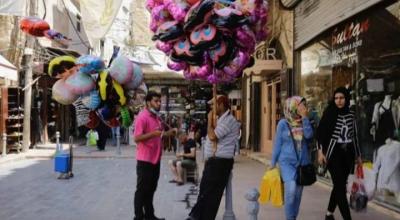Several holidays have come and gone during the crisis that the Lebanese have endured for over two years, and with each holiday, they hope for the return of better days filled with joy and ease. However, there are no celebrations or festivals that can heal the wounds most Lebanese are suffering from; their current situation has left no room for joy in their hearts. They are struggling for the basic necessity of bread, which has become nearly impossible to obtain due to a flour crisis driven by unscrupulous individuals who humiliate people at bakery doors with premeditation and a complete lack of responsibility.
While these days used to signify joy and merriment, leading up to Eid with shopping and festivities meant to bring happiness to children and gather friends and loved ones, they have become a heavy burden for those with no money in their hands and who have lost even the most basic components of life.
The commercial market in Baalbek is sluggish just days before the blessed Eid al-Adha. The only indication of the approaching holiday is the calls to prayer from the mosques, and there is no sparkle in the children's eyes after they have completed their shopping for clothes. Local pastry shop owners are not busy preparing Eid treats; instead, everyone is preoccupied with managing their daily needs of bread, water, and food. The essentials for Eid have become a thing of the past and seem to disappear even more each year as the crisis tightens its grip on the people, and the skyrocketing dollar has scrambled the price lists, draining the pockets of Baalbek residents to the point where one salary may not even buy Eid clothes for their children. Their concerns have shifted from celebrating Eid to merely surviving.
There is no noticeable crowd except in front of the bakeries to buy bread, as the crisis in Baalbek-Hermel continues without any solutions. Cars barely stop in the market, unlike previous years when crowds suffocated the air. Residents from surrounding villages would typically flock to the Baalbek market for their Eid needs. While some may still be able to shop due to relatively good financial circumstances or support from expatriates sending them fresh dollars, Ali J., a modest shop owner who has not priced his goods in dollars yet, tells "Nidaa al-Watan": "The living conditions are very difficult, coinciding with a strike by public institutions we used to rely on for employees' support. Their situation is currently very bad, and they have not received their salaries this month. The commercial activity is declining, and those who have dollars no longer see the Baalbek market as their destination."
He adds, "The festivals that were held in Baalbek, such as the shopping festival, have also suffered setbacks due to difficult financial conditions, so we are still counting on international festivals. Prices in Baalbek market are fluctuating, but they cater to all economic classes as there are shops for everyone according to their capabilities."
On the people's side, one woman shares with "Nidaa al-Watan" that she hasn't purchased any holiday necessities, struggling to secure even a loaf of bread for her three children after much effort and long waiting. She considers this to be "one of the worst days we have faced in our lives; we have neither sufficient salaries nor a traveler to support us, leaving us with hope only in God."




